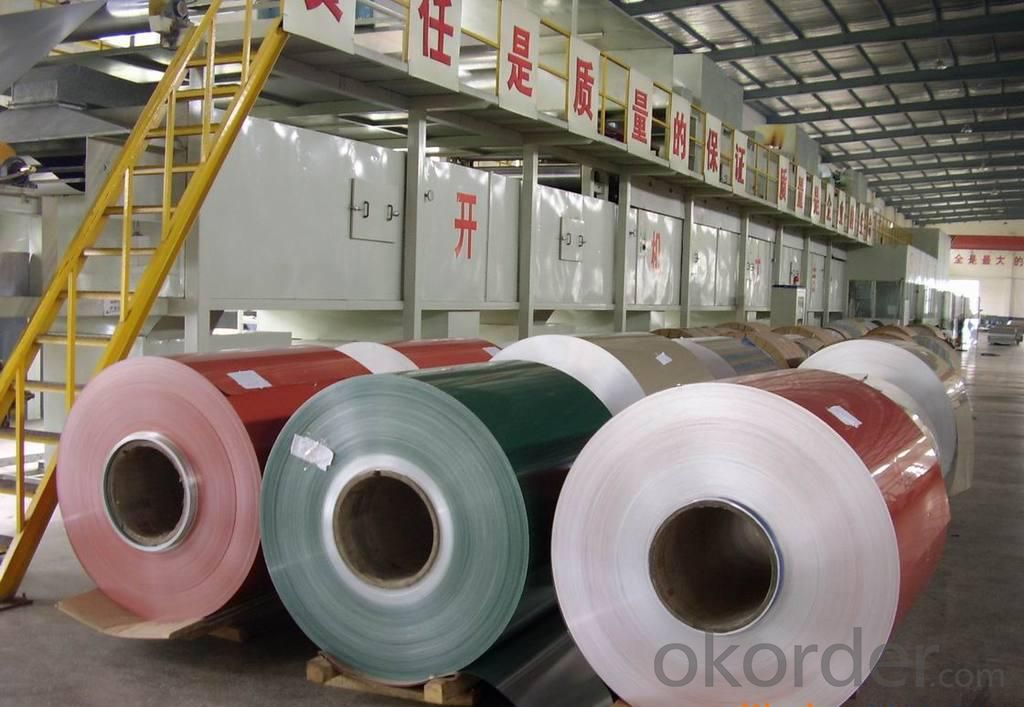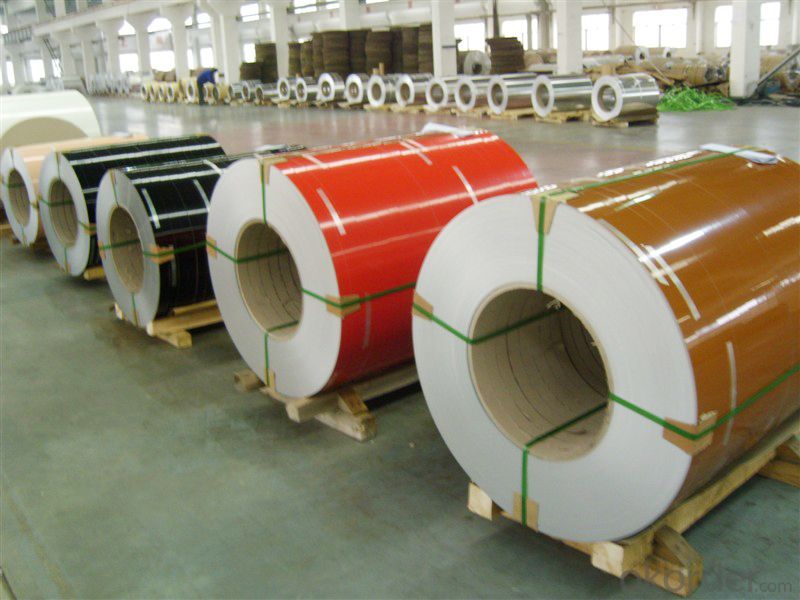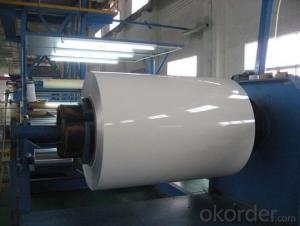Coated Aluminium Coil for Aluminium Rolling Shutter Doors
- Loading Port:
- Shanghai
- Payment Terms:
- TT OR LC
- Min Order Qty:
- 5 m.t.
- Supply Capability:
- 60000 m.t./month
OKorder Service Pledge
OKorder Financial Service
You Might Also Like
Item specifice
Coated Aluminium Coil for Aluminium Rolling Shutter Doors
Description
Alloy | 1060, 1100, 3003, 8011, etc. |
Temper | H16, H18, H24, H26, H28 |
Thickness | From 0.05mm to 3.0mm |
Width | Standard width:1240mm |
Special width:1300mm, 1520mm, 1570mm, 1595mm | |
Diameter | Standard dia:1200mm |
Interior dia:150mm,405mm,505mm | |
Weight | 2.5 T/coil,3.0 T/coil |
Coating | PE, PVDF, ACRYLIC |
Surface | Embossed, mill finish, coated |
Color | AS to code RAL |
Gloss | 10-90%(EN ISO-2813:1994) |
Coating Thickness | PE: more than 18 micron |
PVDF: more than 25 micron | |
Coating Hardness(pencil resistance) | More than 2h |
Coating adhesion | 5J (EN ISO-2409:1994) |
Impact Resistance | No peeling or cracking(50 kg/cm,ASTMD-2794:1993) |
Flexibility(T-bend) | 2T |
MEK resistance | More than 100 |
Advantage | 1.High temperature resistant 2.Weathering resistant 3.Scrubbing resistant 5.Acid or alkali proof 6. Fireproof 7.Light weight material is easy to construct and install |
Out package | Wooden splint with export standard |
Application | ACP, wall cladding, facades, roofs and canopies, ceilings, signboards, blind window, display platforms, electrical panels, etc |
Manufacturing
Decoiler → Accumulator →Tension Leveler →Acid & Alkali Cleaner → Rinse →Conversion Treatment → Priming coater →Infrared Curing Oven →Main coater →Floatation Curing Oven →Strippable Film Applicator → Exit Accumulator → Recoiler


Polyester Coatings (PE)
PE (polyester) coatings exhibit an excellent combination of hardness, flexibility, flow, appearance, and superior resistance to dirt retention in indoor and outdoor applications. These coatings are highly resistant to abrasion, metal marking, staining, and marring, and require minimal maintenance. Glazetech uses polyester paints which provide excellent colour and gloss retention properties.
Polyvinylidene Fluoride Coatings (PVDF)
PVDF (polyvinylidene fluoride) is a chemical resistant thick film barrier coating commonly used in architectural applications where both excellent appearance and substrate protection must be maintained over a long period of time. This coating is unaffected by most chemicals and solvents and has excellent wear and abrasion resistance. PVDF also has a high dielectric strength, excellent resistance to weathering and the ability to self extinguish.
Application
Widely used in manufacturing of products as well as other industrial applications like:
Products Materials: PP cap stock, the traffic sign, air-conditioner heat and exchangers, food container, household foil, pharmaceutical packing, cigarettes packing etc.
Building Materials: aluminum curtain wall base plate, ACP, aluminum, ceilings, aluminum sheets, honeycomb panels and aluminum roofing, lighting decoration, household electrical appliances, food package (such as pop can cover & ring-pull), furniture ect.
FAQ
--Q: Do you provide free samples?
--A: Yes, free samples will be sent to you on freight at destination.
--Q: Can I get your latest products catalogue?
--A: Yes, it will be sent to you in no time.
--Q: What is the MOQ?
--A: 2 tons
--Q: What are your payment terms?
--A: We accept L/C, T/T.
--Q: What kinds of alloy can you supply?
--A: 1000 series: 1050, 1060, 1070, 1100, 1145, 1200
3000 series: 3003, 3004, 3105, 3104
5000 series: 5052, 5083, 5754, 5182
6000 series: 6061, 6063, 6062, 6063
8000 series: 8011, 8021
--Q: What kinds of temper can you supply?
--A: O-H112: O,H12,H14,H16,H18,H22,H24,H26,H,32,H34,H111,H112
T3, T4, T6
- Q:Can the little can opening cap things on an aluminum can be recycled? My friend told me if you fill a two liter bottle with them you can get loads of cash. Is this true?
- Yes. Aluminium can be recycled. (watch the TV ad, UK) No. You would need tons of the stuff ( a tonne of copper is only around ?1000) They are usually colleced for charity. And they save up all the 2 litre bottles full! Feel the weight, aluminium is very light.
- Q:What is the cost of aluminum coils compared to other metals?
- The cost of aluminum coils tends to be lower compared to many other metals, such as copper or stainless steel. This is due to the abundance of aluminum resources and the relatively lower production costs. However, it is important to note that the cost may vary depending on factors such as market demand, availability, and specific alloy compositions.
- Q:Are aluminum coils resistant to corrosion?
- Yes, aluminum coils are resistant to corrosion. Aluminum has a natural oxide layer on its surface, which acts as a protective barrier against corrosion. This oxide layer forms when aluminum is exposed to oxygen in the air. It prevents the metal from coming into direct contact with moisture or other corrosive elements. Additionally, aluminum coils can be further protected through various coating or finishing processes, such as anodizing or painting. These additional layers provide an extra level of protection against corrosion, making aluminum coils highly resistant to rust and other forms of deterioration.
- Q:Are aluminum coils suitable for interior design applications?
- Yes, aluminum coils are suitable for interior design applications. Aluminum is a versatile material that offers durability, lightweight properties, and resistance to corrosion. It can be easily shaped, painted, or coated to match various design aesthetics. Additionally, aluminum coils are commonly used for decorative purposes like ceiling panels, wall cladding, and furniture components, making them a popular choice in interior design projects.
- Q:The heat of fusion of aluminum is 3.95kj/g. What is the molar heat of fusion of aluminum? What quantity of energy is needed to melt 10.0g of aluminum? What quantity of energy is required to melt 10.0 mol of aluminum? Three questions i need help with can someone show me step by step please so i can get it thank you a bunch
- This Site Might Help You. RE: heat of fusion of aluminum? The heat of fusion of aluminum is 3.95kj/g. What is the molar heat of fusion of aluminum? What quantity of energy is needed to melt 10.0g of aluminum? What quantity of energy is required to melt 10.0 mol of aluminum? Three questions i need help with can someone show me step by step please so i can...
- Q:How are aluminum coils inspected for surface defects?
- To ensure the production of high-quality and defect-free aluminum coils, a variety of methods are employed to inspect for surface defects. Visual inspection is one commonly used technique, wherein trained inspectors carefully examine the entire surface of the coils for imperfections such as scratches, dents, or unevenness. This inspection takes place in optimal lighting conditions to ensure visibility and accuracy. In addition to visual inspection, more advanced techniques are utilized to detect subtle surface defects. An example of such a method is fluorescent penetrant inspection, where a fluorescent dye is applied to the coil surface. This dye seeps into any surface defects or cracks, and after a certain period of time, the excess dye is removed. The coil is then examined under ultraviolet light, which causes the dye to fluoresce, thereby making any defects easily visible. Another frequently used technique is eddy current testing, a non-destructive method that employs electromagnetic induction to identify defects like cracks or delaminations on the surface of aluminum coils. A probe is passed over the coil surface, and any variations in electrical conductivity caused by defects are detected and analyzed. Furthermore, automated systems equipped with high-resolution cameras and image-processing software can also be utilized for surface inspection. These systems capture detailed images of the coil surface, which are then analyzed by the software based on predefined criteria to identify any defects. This method ensures consistent and objective inspection results. Overall, thorough inspection procedures are implemented to detect and address any surface defects in aluminum coils before further processing or usage. These inspections are vital in maintaining product quality, adhering to industry standards, and ensuring customer satisfaction.
- Q:How are aluminum coils used in the production of food processing equipment?
- Aluminum coils are widely used in the production of food processing equipment due to their desirable characteristics and benefits. These coils are typically made from high-quality aluminum alloy, which offers excellent heat conductivity, corrosion resistance, and durability. One primary application of aluminum coils in the food processing industry is in the construction of heat exchangers. These heat exchangers are essential components of various food processing equipment, such as ovens, fryers, and refrigeration systems. The aluminum coils within the heat exchangers facilitate the transfer of heat between different mediums, ensuring efficient and precise temperature control during food processing. Another important use of aluminum coils is in the manufacturing of evaporator coils. These coils are integral to refrigeration systems used in commercial food processing. The evaporator coils, made from aluminum, aid in the cooling process by absorbing heat from the surrounding environment and allowing refrigerants to evaporate, thereby maintaining low temperatures within the equipment. Additionally, aluminum coils find application in the construction of food storage and transportation equipment, such as refrigerated trucks and containers. Aluminum's lightweight nature contributes to fuel efficiency and enables easier transportation of food products while maintaining their quality and freshness. Furthermore, aluminum coils are valued for their hygienic properties and ease of cleaning, making them ideal for food processing equipment. Aluminum surfaces can be easily sanitized, ensuring a high level of cleanliness and preventing contamination during food production. Overall, aluminum coils play a crucial role in the production of food processing equipment by providing excellent heat transfer, corrosion resistance, durability, and hygienic qualities. Their usage helps ensure efficient food processing operations, optimal temperature control, and the maintenance of food quality and safety standards.
- Q:Are aluminum coils suitable for lightweight panel applications?
- Yes, aluminum coils are suitable for lightweight panel applications. Aluminum is known for its lightweight and corrosion-resistant properties, making it an excellent choice for lightweight panel applications. Aluminum coils can be easily formed and shaped into panels of varying sizes and thicknesses, making them highly versatile. Additionally, aluminum has a high strength-to-weight ratio, allowing for the creation of strong and durable lightweight panels. These panels find applications in various industries such as automotive, aerospace, construction, and transportation, where weight reduction is important. Overall, aluminum coils are a suitable choice for lightweight panel applications due to their lightweight nature, corrosion resistance, versatility, and strength.
- Q:What are the typical thickness tolerances for aluminum coils?
- The typical thickness tolerances for aluminum coils depend on the specific application and industry standards. However, in general, the thickness tolerances for aluminum coils can range from +/- 0.002 inches to +/- 0.005 inches.
- Q:What are the common fabrication techniques for aluminum coils?
- Aluminum coils can be fabricated using several common techniques, including rolling, annealing, slitting, and coating. The primary fabrication technique for aluminum coils is rolling. This involves passing a continuous strip of aluminum through a series of rollers to gradually reduce its thickness and increase its length. The process can be done hot or cold, depending on the desired properties of the coil. To improve the mechanical properties of aluminum coils, annealing is often used. This heat treatment process involves heating the coil to a specific temperature and then cooling it slowly to relieve internal stresses and increase its ductility. This makes the coil easier to work with during subsequent fabrication processes. For cutting wide aluminum coils into narrower strips, the technique of slitting is employed. This involves passing the coil through sharp rotating knives that make precise cuts along the length of the coil. Slitting allows for customization and the production of coils in different widths, which can be used for various applications. Coating is another commonly used fabrication technique for aluminum coils. It involves applying a protective or decorative coating onto the surface of the coil to enhance its appearance and improve its performance. Various types of coatings, such as paint, anodizing, and powder coating, provide corrosion resistance, durability, and aesthetic appeal. In summary, these fabrication techniques are essential in transforming aluminum into coils that meet specific requirements for industries like construction, automotive, and aerospace.
1. Manufacturer Overview |
|
|---|---|
| Location | |
| Year Established | |
| Annual Output Value | |
| Main Markets | |
| Company Certifications | |
2. Manufacturer Certificates |
|
|---|---|
| a) Certification Name | |
| Range | |
| Reference | |
| Validity Period | |
3. Manufacturer Capability |
|
|---|---|
| a)Trade Capacity | |
| Nearest Port | |
| Export Percentage | |
| No.of Employees in Trade Department | |
| Language Spoken: | |
| b)Factory Information | |
| Factory Size: | |
| No. of Production Lines | |
| Contract Manufacturing | |
| Product Price Range | |
Send your message to us
Coated Aluminium Coil for Aluminium Rolling Shutter Doors
- Loading Port:
- Shanghai
- Payment Terms:
- TT OR LC
- Min Order Qty:
- 5 m.t.
- Supply Capability:
- 60000 m.t./month
OKorder Service Pledge
OKorder Financial Service
Similar products
New products
Hot products
Related keywords




























